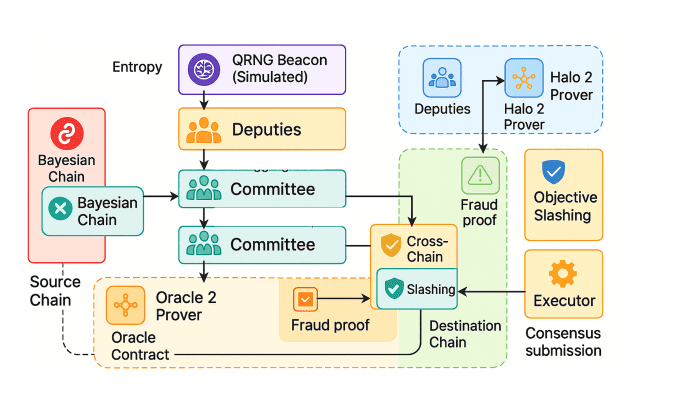Cross-chain communication is currently under significant scrutiny due to its reliance on vulnerable bridges and oracles, which have been implicated in losses surpassing $2.8 billion attributed to security flaws and inconsistent data validation. Addressing this pressing concern, researchers from ETS Montréal, including M. Z. Haider, Tayyaba Noreen, M. Salman, and Kaiwen Zhang, have introduced V-ZOR, a groundbreaking verifiable oracle relay designed to bolster security within decentralized finance platforms.
V-ZOR enhances security through the integration of zero-knowledge proofs alongside innovative randomness generation and cross-chain restaking mechanisms. This design eliminates the need for potentially compromised multisignature schemes and optimistic assumptions that currently compromise the reliability of many cross-chain systems. By achieving trust-minimized operations, V-ZOR increases the cost of collusion while maintaining a high-performance standard—boasting sub-300k gas verification and a latency of just one block.
At its core, V-ZOR employs advanced cryptographic techniques to facilitate secure and efficient cross-chain data delivery. By utilizing zero-knowledge proofs, specifically the Halo 2 SNARKs, the protocol can confirm the accuracy of off-chain data aggregation without disclosing the data itself. This capability ensures the integrity and privacy of the information being transferred. To further enhance security, a simulated quantum randomness mechanism is implemented, which employs verifiable random functions to select reporters in an unbiased manner, thus safeguarding against data manipulation.
A key feature of V-ZOR is its unified restaking framework, which incentivizes honest behavior while penalizing malice—reporters must stake tokens which are forfeited in cases of fraud. This trustless operation allows for verifiable correctness, high security, swift finality, and efficiency, with native features that generate proofs in under a second, alongside fast on-chain verification. Data verification reaches one-block finality, and the system significantly elevates the threshold for manipulation compared to existing alternatives.
The operational strategy involves off-chain reporters collecting and aggregating data, subsequently generating a Halo 2 SNARK proof to verify this data’s correctness. The proof is submitted to a smart contract for efficient verification, ensuring that honest reporters are rewarded, while malicious actors face penalties. In comparison to similar solutions like Chainlink CCIP and Wormhole v2, V-ZOR’s unique cryptographic guarantees and objective slashing mechanisms render it a more secure and dependable solution for cross-chain communication.
Future developments aim to integrate live quantum random number generation sources, augment compatibility with additional blockchains, and formalize the system’s cryptographic guarantees, thereby optimizing stake distribution and exploring adaptive committee sizing for enhanced scalability. Through these innovations, V-ZOR lays a robust foundation for the evolution of trustless and interoperable blockchain applications.
In summary, V-ZOR signifies a substantial advancement in securing cross-chain communication, directly countering the vulnerabilities found in existing oracle designs. With its innovative approach combining zero-knowledge proofs and a unique, incentive-driven design, it stands poised to reshape decentralized data transfer methodologies, fundamentally improving reliability and security in blockchain ecosystems.







